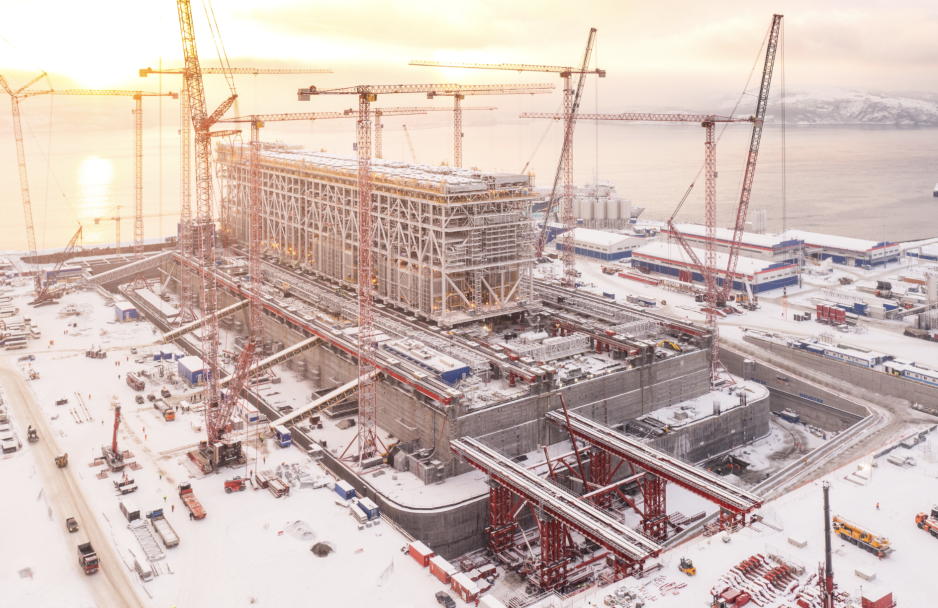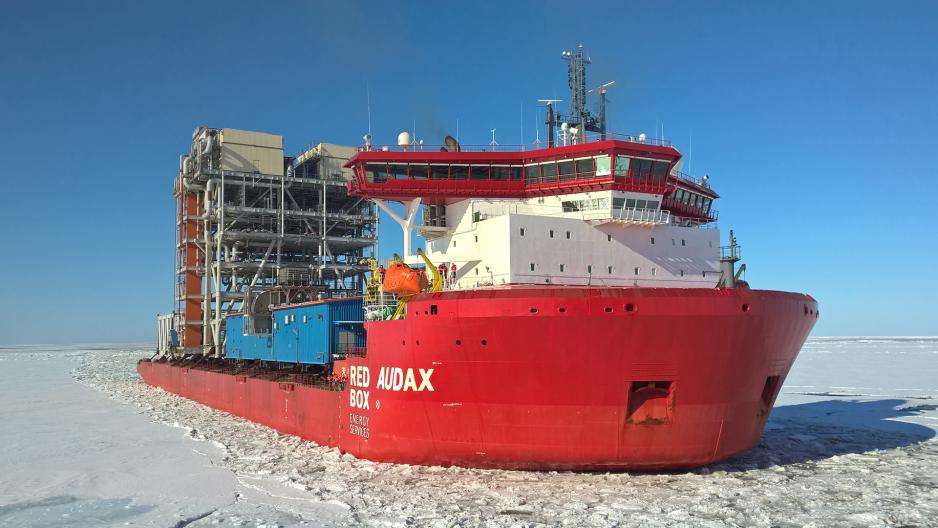EU Sanctions Stop Construction of Arctic LNG 2 Modules in China

LNG Construction Center at Belokamenka near Murmansk. (Source: Courtesy of Novatek)
The impact of EU sanctions against Russia continues to ripple through the Russian energy sector. Chinese yards constructing LNG modules for Novatek’s Arctic LNG 2 will halt work on the project by the end of May.
The squeeze of EU sanctions targeting the Russian energy sector continues to increase. According to industry publication Upstream a number of Chinese yards, where modules for Novatek’s flagship plant Arctic LNG 2 are under construction, are expected to stop work on the project by the end of May.
Under the EU’s fifth sanctions package from April 8 European companies face a firm deadline of May 27 to conclude any outstanding deliveries. This raises questions if already completed modules ready for shipping can be transported from China to the assembly site in Russia outside Murmansk.
Technip Energies, a lead supplier and service provider for the project, had warned last month that sanctions would complicate the completion of the project.
“The European sanctions now target LNG goods and technology and services more directly, I would say, making the execution of [Arctic LNG 2] more complicated, maybe even highly complicated,” explained Technip’s CEO Arnaud Pieton.
European Exodus from Arctic LNG 2
Since the beginning of EU sanctions a number of major energy companies involved in Russian Arctic energy projects, including Total, Exxon Mobil, BP, Shell and Equinor, opted to end their involvement in Russian joint ventures or have taken financial write-offs. Last week, Japan’s Mitsui also announced that it had taken an accounting loss related to its 10 percent stake in the project.
Novatek’s Arctic LNG 2 project involves a complex logistics chain in which modules are prefabricated across several yards in China before being shipped to a large assembly yard outside Murmansk. From there completed modules are towed to the site of Arctic LNG 2 on the Gydan peninsula in the Russian Arctic.
The project consists of three trains, or production lines, with a capacity of 6.6 million tons of LNG per year each. The first train has reached a high degree of completion, around 85-95 percent according to industry sources, while trains two and three, are currently under construction in China. The announced work stoppage all but ensures that Arctic LNG 2 will not enter production as planned. The first train was supposed to begin production in 2023 with subsequent trains following in 2024 and 2026.
Work stops at Chinese yards
According to Upstream, work on train three was halted on April 29 with train two following by May 27. All foreign workers will be leaving the work sites by the end of the month in time to comply with the EU’s sanctions which also apply to existing contracts. This places Novatek in a race against time to procure essential equipment and technology before deliveries to Russia will become much harder or stop entirely.
Fabrication of modules is spread across at least a half dozen Chinese yards, including Bomesc, Cosco Shipping Heavy Industry, Penglai Jutal Offshore Engineering (PJOE), Wilson Offshore Engineering and Qingdao McDermott Wuchuan. Some yards, including PJOE and Cosco, have completed their respective modules and are awaiting directions from Technip about shipment, while others, such as Bomesc, are still in the midst of construction. Train 2 is around 40 percent completed, while Train 3 stands at less than 10 percent.
“It could be that there is a way for the client to complete or partially complete train one, but train two and train three for which the modules are still in China, for which there has been a lot less shipments into Russia,” further elaborated Technip’s Pieton.

Polar Class Heavy Deck Carrier Audax traveling through ice-covered waters. Source: Courtesy of Deltamarin.
Can project control be handed over?
In 2019 Technip had received a $7.6bn contract to construct Arctic LNG 2. The company is now deciding how to unroll its involvement in the project and hand over control to Novatek or related partners as it is focused on complying with the EU’s sanctions regime. “[Sanctions] could significantly reduce our involvement beyond Q2. So, we have been working towards an orderly handover of the project to our clients. Things are going to be obviously more complicated, likely, beyond Q2,” explained Pieton. “The latest train of sanctions from the EU are making it, I would say, a lot more difficult for us to envisage a normal execution of the project in Q2 and beyond.”
Novatek will likely be facing increasing difficulty to replace western companies exiting the project. Its partners, such as Technip, European chemical company Linde, and German industrial conglomerate Siemens, all provide vital construction, supply, or maintenance services to the project. European companies, such as Red Box Energy Services, are also contracted to transport modules from China to Russia. The last delivery of modules occurred earlier this year via the NSR.
Bomesc, Cosco, Wison, and PJOE did not respond to requests for comment. Technip Energies replied but did not provide further information in time for publication.

